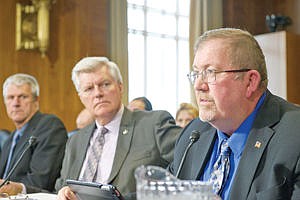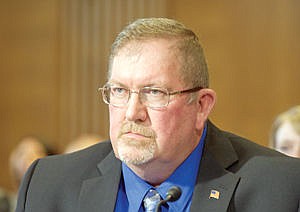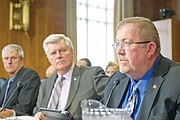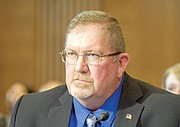Commissioner Peck speaks to Congress
Lincoln County Commissioner Mark Peck appeared before the United States Senate Energy and Natural Resource Committee Tuesday morning and urged Congress to rectify not just the processes used to manage the forest, but also the paradigm.
“The harmony and vitality of my community have given way to decades of conflict built upon the false premise that management, conservation, wildlife and sustainable community economics are diametrically opposed to one another,” he said.
Peck spent little time discussing the history of Lincoln County’s woes, instead focusing his remarks on solutions to the economic problems created from the artificial ideological conflict between industry and conservation.
The first solution Peck suggested was a change in not just how the forest is managed, by in the framework behind the decisions.
“The process is fundamentally broken and we must fundamentally change how we look at resource management in this nation. That can only happen with a complete overhaul of our current structure of laws, rules and attitudes,” he said.
That change, Peck said, involves institutionalizing much of what is being done in Lincoln County right now in terms of collaboration and local consensus-building. He praised the work of the Kootenai Forest Stakeholder Coalition and the members’ work to find common ground.
“The Kootenai Forest Stakeholder Coalition is our local collaborative group, formed in 2006, and through no lack of blood, sweat and tears has achieved tremendous progress. A diverse group of local conservation groups, recreation, industry, elected officials and wilderness advocates have come together under a common ground concept and have become a model for on the ground local management,” he said.
Peck said he is focused on working collaboration with state and federal agencies, as well as interested local groups to help improve the overall health, productivity, sustainability and protection of the forest. The problem, however, isn’t with the collaborative process it’s with the implementation of those conclusions.
“We are tired of hearing that if we just sit down and collaborate with each other we will resolve our forest’s issues. We have collaborated. Successfully. It is the system of implementation of our hard-sought conclusions that is broken – not our local resolve or ability to find common ground,” he said.
Peck called for some specific actions from congress to help rectify the problems being faced in Lincoln County.
First and foremost, he said the full funding of the Secure Rural Schools and Payment in Lieu of Taxes programs should happen immediately and continue until timber harvests increase to such a point as to make them unnecessary.
He also suggested congress form a “tiger team” to review current laws, rules and administrative procedures and make specific recommendations to reform forest management practices for the future.
That team, Peck suggested, should include representatives from wilderness, conservation, recreation, sportsmen, government and wildlife arenas and must have a clear mandate with timelines, a budget, authority and accountability.
One key issue Peck mentioned is reforming the Equal Access to Justice Act.
“We must find the balance in the law to protect its intent and yet protect against perceived frivolous or excessive use of the law in federal land management cases. I believe that modernization of current laws and rules that better meet the overall needs will solve much of the problem,” he said.
Peck said non-profit groups use the current law as a business model to fund obstructionist tactics designed to bring any and all work on the forest to a standstill. The problem, he said, is finding a balance between ensuring the individual rights of the people and their access to due process and eliminating the abuse by professional litigators.
The constant litigation of projects in the forest has created a situation where science is secondary to legal technicalities.
“Put more simply,” he said, “if the Forest Service is managing the forest to assure they will win in court, who is managing the forest for the forest?”
Peck said his remarks were warmly received by the committee, on which Sen. Daines of Montana serves, as well as by the rest of Montana’s congressional delegation, Sen. Jon Tester and Rep. Ryan Zinke.
“They’re well aware of what’s going on out here and committed to solving the problem. They told me everything has to be on the table,” he said.
Peck had the time to meet with each of Montana’s congressmen and members of their staffs. He said he was impressed with how each of the members, although espousing different political philosophies, have come together and share a commitment to solving the problems facing not just Lincoln County, but other counties facing similar challenges.
The highlight of his trip was a scheduling coincidence that put him in the nation’s capital at the same time as a group of students from Libby High School. The students, part of the Close Up program, were in Washington for the week to study, first-hand, the American political system.
“Overall it was a very positive trip, but looking over my shoulder in that hearing room and seeing that beautiful group of Libby students, that was the highlight,” Peck said.





